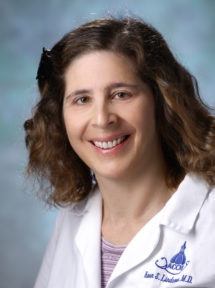By Benjamin Sonnenberg
Going under the needle—a frightening idea, to say the least, but most of us have endured it at least once. And, if you’ve ever been grateful to experience an insensitivity to the pain of operation, you can send your thanks to an anesthesiologist. Last week, I interviewed Dr. Karen Lindeman (ΦBK, University of Pennsylvania, 1979), Associate Professor of Anesthesiology and Critical Care Medicine at Johns Hopkins University School of Medicine. I went into the interview with a clear idea, perhaps naïve, of what it means to be a doctor. By the end, I began to recognize that the medical field is more nuanced than I had thought.
Firstly, why did Dr. Lindeman decide to be an anesthesiologist? She answered quickly and was straightforward: “Because it seemed like fun!” According to Dr. Lindeman, anesthesiology is especially engaging because its practitioners are left alone to solve problems, make decisions, and “see what happens.” I was initially surprised to hear this; after all, isn’t medicine high-stakes? What if something goes wrong? Again, Dr. Lindeman was straightforward: “The most important thing to keep the patient safe is to be careful.” More so than any specific technique, being careful safeguard’s a patient’s health. Yet, Dr. Lindeman’s expertise and talents also enable her to experiment and take risks.
What are some of these talents? In addition to being renowned within her field, with numerous honors and credentials to her name, Dr. Lindeman has been published in such prestigious journals as the American Journal of Physiology and The International Journal of Biostatistics. Dr. Lindeman also served as editor-in-chief of the journal Anesthesiology from 1994 to 2000. But how important is writing to someone in the medical profession? Dr. Lindeman says that it depends on your focus. For a clinical anesthesiologist, who treats a single patient at a time, publishing may not be so important. But for Dr. Lindeman, an academic anesthesiologist who doubles as a professor, aiding research and training the next generation of practitioners, publishing is key. She is currently working with her colleagues on an interesting study related to pregnant women and blood transfusions. She is also examining the use of a particular anti-nausea drug on pregnant and non-pregnant women, testing when it should be used to its best effect. Dr. Lindeman and the team hope to publish these findings when complete.
Regarding her important role as teacher and mentor, Dr. Lindeman had much to say. Before speaking with her, I had already interviewed several professors and was interested in what strategies Dr. Lindeman employs in the classroom. It’s hard to “constantly come up with improved ways to teach,” she said. “It’s easy to get settled into a way of teaching and doing it same way, but it’s important to keep re-evaluating the ways we teach and improve it for future generations.” To do this, she eschews the parroting methods so hated by many students today. Dr. Lindeman prefers to make students uncomfortable, but in a good way. In her words, “I like to ask the trainees certain thought-provoking questions, rather than give them long lists of facts.” The trainees may not always have all the information, but neither does the doctor when in the operating room. Thus, Dr. Lindeman encourages her trainees to use reasoning and make sensible decisions under constraints.
Towards the end of the interview, I asked Dr. Lindeman how important it is for a doctor to be well-rounded. To my surprise, she said that it’s not, at least in certain cases. With refreshing frankness, she said, “Many people are focused.” But she did emphasize that her willingness to experiment and be flexible has been important in her success. She says that it’s helped her recognize a valuable truth: your way is not the only way. In a field that is constantly undergoing change, where new research overturns old methods and helps our doctors to provide better services, a desire and a willingness to continue to learn are invaluable. Should you ever be in need of the needle, you could hardly find someone better for the job than Dr. Karen Lindeman.
Benjamin Sonnenberg is a junior at the University of Maryland, College Park, double majoring in history and education. The University of Maryland is home to the Gamma of Maryland Chapter of Phi Beta Kappa.




